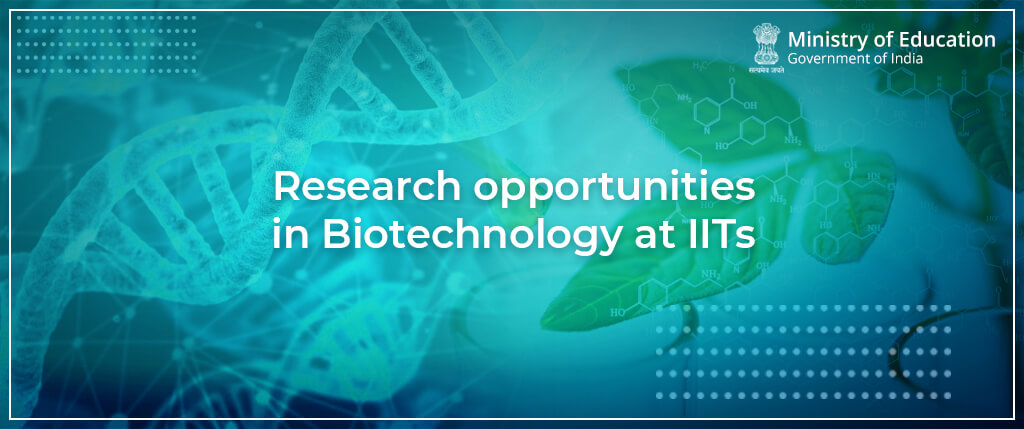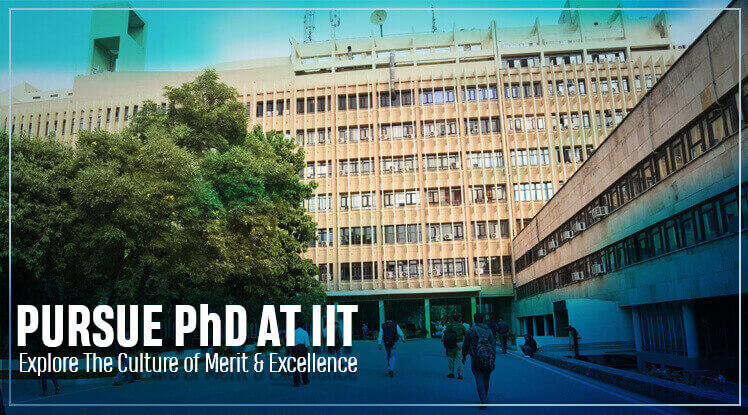Research opportunities in Biotechnologyat IITs

Biotechnology is a frontline area of science and technology with immense potential for the benefit of humankind, with a far-reaching impact on diverse areas such as healthcare, diagnostics, agriculture, food, environment, and consumer products. Biotechnology has great potential in India, where cutting-edge product development and research are underway. India is among the top 12 destinations for biotechnology in the world, with approximately a 3% share in the global biotechnology industry. The biotechnology sector is recognized as one of the key contributors to India’s vision of reaching a $ 5 Trillion Economy by 2024. The sector plays a key role in the global vaccine market, India being one of the world’s largest vaccine producers. India is the largest supplier of the DPT, BCG, and Measles vaccines globally. About 70% of the vaccines used around the world for extended immunization programs are made in India. India is also one of the first countries to have a separate department of biotechnology (DBT) dedicated to Biotechnology. The goals of DBT are to build and strengthen a strong education and research ecosystem across the country; and make India globally competitive in biotechnology research, innovation, translation, entrepreneurship, and industrial growth.
What is Biotechnology
Biotechnology is the technology that utilizes biological systems, living organisms, or parts of this to develop or create different products. Broadly, this can be defined as the engineering of organisms for human usage. Humans have used biotechnology since the dawn of civilization. Early examples of biotechnology applications include breeding food crops or domestic animals, making cheese, yogurt, bread, beer, and wine using micro-organisms. Since the middle of the twentieth-century biotechnology has rapidly progressed and expanded. With the development of genetic engineering in the 1970s, research in biotechnology developed rapidly because of the new possibility to make changes in the organisms’ genetic material (DNA). Recent developments in molecular biology have given biotechnology new meaning, new prominence, and new potential. Today, biotechnology is being used in numerous areas, including agriculture, medicine, environment, food processing, industry, and forensics.
Applications of Biotechnology
The applications of biotechnology vary from the development of hybrid plant and genetically modified disease-resistant mutant strain containing seeds for high yielding superior quality plants to the production of vaccines, including DNA vaccines.
Agriculture: The application of biotechnology in agriculture offers tremendous benefits, including increased crop productivity, enhanced crop protection, improvement in food processing, improved nutritional value, better flavor, reduced dependence on fertilizers, pesticides, and other agrochemicals, and production of vaccines.
Medicine: The recombinant DNA technological processes have made an immense impact in healthcare by enabling the mass production of safe and more effective therapeutic drugs. Biotechnology is applied in the following areas of medicine: production of drugs and therapeutics, genetically modified organism, analysis of genes in genetic diseases, corrections of genetic defections, etc.
Industry: Industrial biotechnology applies modern molecular biology techniques to improve efficiency and reduce the environmental impacts of industrial processes like textile, paper and pulp, and chemical manufacturing.It uses enzymes and micro-organisms to make bio-based products in sectors such as chemicals, food ingredients, detergents, paper, textiles and biofuels. In the current decade, significant progress has been made in creating genetically modified organisms that enhance the diversity of applications and the economic viability of industrial biotechnology.
Environment: Environmental biotechnology is a system of scientific and engineering knowledge related to the use of microorganisms and their products to prevent environmental pollution through biotreatment of solid, liquid, and gaseous wastes, bioremediation of polluted environments, and biomonitoring of environment and treatment processes. Environmental biotechnology includes a broad range of applications such as bioremediation, prevention, detection and monitoring, genetic engineering for sustainable development and better quality of living.
Biotechnology is a truly interdisciplinary technology that has led to significant socio-economic progress. It has emerged as a promising career option, and many students are taking an interest in this field. The future of biotechnology research is strong and very promising. Current progress in Biotechnology research has greater potential to be the basis of subsequent innovation to solve society’s big challenges such as ensuring food security for the ever-increasing population, bringing affordable healthcare, resource efficiency, precision agriculture, climate change, and meeting energy shortages.
Research opportunities at IITs
Indian Institutes of Technology are globally recognized as premier institutions for science and engineering education and research. They have vibrant research culture, top faculty, and tie-ups with leading academic institutions around the world making them the best place to study biotechnology. They offer an excellent course curriculum in biotechnology and cutting-edge facility for biotechnology research. The focus of the IITs is on creating a strong ecosystem for facilitating basic, early, and late translational research and entrepreneurship in all sectors of biotechnology. They emphasize the promotion of excellence, innovation, and technology leading to product development, building capacities, and human resource and infrastructure.
IIT Delhi: The Department of Biochemical Engineering & Biotechnology at IIT Delhi has a unique place in the development of the biochemical engineering discipline in India. The department conducts research in frontier areas of biochemical engineering and biotechnology. The students and faculty collaborate in the research projects of their area of interest, from which an MTech or MS (R) or Ph.D. thesis is developed. The department offers a unique blend of expertise in applied biological sciences, chemical engineering, and biochemical engineering. School of International Bio-design (SiB)is a biomedical technology innovation program initiated as the Stanford India Bio-design program to train the next generation of medical technology innovators. It was jointly established at AIIMS, New Delhi, and IIT Delhi. Kusuma School of Biological Sciences at IIT Delhi has research programs in the interdisciplinary areas of biological sciences.
IIT Kharagpur: The Department of Biotechnology at IIT Kharagpur was started in 1986. The department has teaching and research programs that encompass various fundamental and applied aspects of modern biotechnology. Major research activity remains in the field of molecular biology, immune technology, plant biotechnology, microbial technology, bioprocess engineering, biomaterial and tissue engineering, structural biology, and bioinformatics. In addition, the Institute has recently established a School of BioScience, to integrate interdisciplinary research involving various departments, centers, and schools and to give a boost to comprehensive bioscience-oriented education and research.
IIT Madras: The Department of Biotechnology at IIT Madras provides an ideal milieu for interdisciplinary collaborative research and interaction between students and faculty. The primary research areas include alternate energy, biomaterials, bioprocess engineering, computational biology and bioinformatics, green chemistry, industrial microbiology, cancer biology, molecular virology, plant developmental biology, and protein structure-function studies, among others. The Department of Biotechnology encourages applicants from a wide range of specializations for admissions to the research programs. Healthcare Technology Innovation Centre (HTIC), a multi-disciplinary R&D center, is a joint initiative of IIT Madras and DBT that brings together technologists, engineers, doctors and healthcare professionals, industry, and government to develop healthcare technologies for the country.
Other IITs: The Department of biological sciences & Bioengineering at IIT Kanpur, Department of Biotechnology at IIT Hyderabad, Department of biosciences & Bioengineering at IIT Bombay, IIT Guwahati, and IIT Roorkee have outstanding teaching and research programs in the interdisciplinary areas of biotechnology
Apply for a PhD at IITs
Apply for a PhD at IITs — the best technology institutions of India







